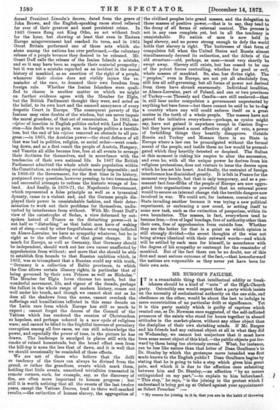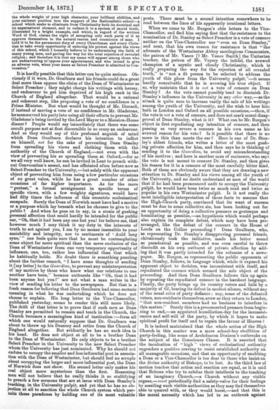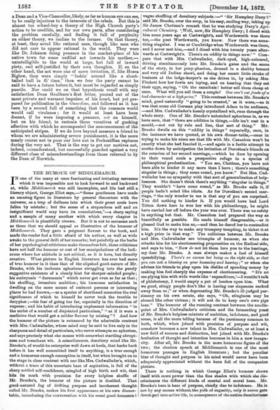MR. BURGON'S FAILURE.
IT is a remarkable thing that intellectual oddity or freak- ishness should be a kind of " note " of the High-Church party. Ostensibly one would expect that a party which insists on the necessity of ecclesiastical authority on the one side, and obedience on the other, would be about the last to indulge in mere eccentricities of no particular drift or significance. Yet it is this party mainly which is guilty of caprices which remind one, as Dr. Newman once suggested, of the self-inflicted penances of the saints who stood for hours together in absurd attitudes in the market-places, without any other object than the discipline of their own shrinking minds. If Mr. Burgon and his friends had any rational object at all in what they did on Wednesday, we cannot but conjecture that it must have been some secret object of this kind, —the public objects put for- ward by them being too obviously unreal. What, for instance, can be leas like nature than that letter of Dean Goulburn's to Dr. Stanley by which the grotesque move intended was first wade known to the English public ? Dean Goulburn begins by stating that he is going to take a step which gives him great pain, and which it is due to the affection once subsisting between him and Dr. Stanley,—an affection " by no means extinguished on my part,"—to explain to him beforehand. " This step," he says, "is the joining in the protest which I understand is being got up at Oxford against your appointment as Select Preacher " " My reason for joining in it is, that you are in the habit of throwing
the whole weight of your high character, your brilliant abilities, and your eminent position into the support of the Rationalistic school—a school which seeks to eliminate from Christianity both its doctrinal and its supernatural element, and to reduce it to a system of moral truth, illustrated by a bright example, and which, in regard of the written Word of God, claims the right of accepting only such parts of it as approve themselves to the natural reason and conscience of man. I hold it to be the paramount duty of every Churchman and every Chris- tian to take every opportunity of entering his protest against the views of this school, which I honestly believe to be undermining the faith of many young men, and paving the way for the total rejection of revealed religion ; and therefore it is that my name will appear among those who are endeavouring to'oppose your appointment, and who intend to give an adverse vote, when your name as Select Preacher is admitted to Con- vocation."
It is hardly possible that this letter can be quite serious. Ob- viously if it were, Dr. Goulburn and his friends could do a great deal more than oppose the claim of the Dean of Westminster as Select Preacher ; they might charge his writings with heresy, and endeavour to get him deprived of his high rank in the Church of England altogether. That would be a rational and coherent step, like proposing a vote of no confidence in a Prime Minister. But what would be thought of Mr. Disraeli, if instead of moving a vote of no confidence in Mr. Gladstone, he manceuvred his party into using all their efforts to prevent Mr. Gladstone's being invited by the Lord Mayor to a Mansion-House dinner ? People would say immediately that there was some occult purpose not at first discernible in so crazy an endeavour. And so they world say of this profound anguish of mind which Dean Goulburn declares his intention to inflict on himself, not for the sake of preventing Dean Stanley from spreading his views and clothing them with the authority of the Church of England,—not even with the view of preventing his so spreading them at Oxford,—for as we all very well know, he can be invited in Lent to preach with- out Convocation's assent, and has officiated often before now as Select Preacher to the University,—but solely with the apparent object of preventing him from using a few particular occasions of no great value, while he has a great number of other occasions of far higher importance. As for the mere "protest," a formal arraignment in specific terms of specific views, with a few weighty signatures, would have had fifty times the influence of this eccentric ecclesiastical escapade. Surely the Dean of Norwich must have had a motive or a purpose which lay beneath what he chooses to give to the public ? And when he goes on to say, in a strain of gushing personal affection that could hardly be intended for the public ear, "Oh, that it had been any one but you! for believe me, that however much I may think it my duty in the interests of truth to act against you, I am by no means insensible to your amiability and integrity, nor to sentiments of Auld lang syne,' " one feels quite sure that he must be contemplating some object far more spiritual than the mere exclusion of the Dean of Westminster from one very temporary opportunity of influence, one, too, rather less influential than that which he habitually holds. No doubt there is something puzzling about the further remark, " I have some thoughts of sending it [my letter] to the Guardian, to prevent any misinterpretation of my motives by those who know what our relations to one another have been," because outbursts like " Oh, that it had been anyone but you!" are not what a man writes in the view of sending his letter to the newspapers. But that is a fresh reason for believing that Dean Goulburn had some esoteric meaning in what he was undertaking which he does not choose to explain. His long letter to the Vice-Chancellor, published yesterday, seems to render this still more likely. The drift of that letter is to prove that if such men as Dean Stanley are permitted to remain and teach in the Church, the Church becomes a meaningless kind of institution :—from all which one would naturally suppose that Dr. Goulburn was about to throw up his Deanery and retire from the Church of England altogether. But evidently he has no such idea in his head. He does not object at all to be a brother Dean to the Dean of Westminster. He only objects to be a brother Select Preacher in the University to the new Select Preacher whom the University has just nominated. Why he should not endrre to occupy the smaller and less influential post in associa- tion with the Dean of Westminster, but should feel no scruple about occupying the larger and more influential post, the Dean of Norwich does not show. His second letter only makes his real object more mysterious than the first. Reasoning men will not believe that he really thinks it so stultifying to preach a few sermons that are at issue with Dean Stanley's teaching, in the University pulpit, and yet that he has no ob- jection at all to sanction the whole Church system which per- mits these paradoxes by holding one of its most valuable posts. There must be a second intention somewhere to be read between the lines of his apparently irrational letters.
When we come to Mr. Burgon's able letters to the Vice- Chancellor, and find him saying first that the resistance to the nomination of Dr. Stanley as Select Preacher is a vote of censure neither on the Viee-Chancellor nor "even on Dean Stanley," and next, that his own reason for resistance is that "the advocate of the Westminster Abbey sacrilegious Communion, the patron of Mr. Vance [? Mr. Vance Smith] the Unitarian teacher, the patron of Mr. Voysey the infidel, the avowed champion of a mystic and cloudy Christianity, which is really preparing the way for the rejection of all revealed truth," is "not a fit person to be selected to address the youth of this place from the University pulpit,"—it seems hardly conceivable that he is avowing his true object. If so, why maintain that it is not a vote of censure on Dean Stanley ? As the vote cannot possibly tend to diminish Dr. Stanley's influence in the University in any other way,—as the attack is quite sure to increase vastly the sale of his writings among the youth of the University, and the wish to hear him both in London and Oxford on all possible occasions,—then, if the vote is not a vote of censure, and does not mark moral disap- proval of Dean Stanley, what is it? What can be Mr. Burgon's object in first repudiating any intention of censure, and then passing so very severe a censure in his own name as his avowed reason for his vote ? Is it possible that there is no more in this than meets the ear ? Here is one of Dr. Stan- ley's oldest friends, who writes a letter of the most gush- ing private affection for him, and then says he is thinking of sending it to the Guardian, to avoid any misunderstanding of his motives ; and here is another man of eminence, who says the vote is not meant to censure Dr. Stanley, and then gives his reason for it in a censure of the most carefully bitter kind. Both of them are obviously aware that they are drawing a new attention to Dr. Stanley and his views among all the youth of the University, and no doubt understand as men of the world that if he had been pronounced unfit to occupy the University pulpit, he would have been twice as much read and twice as popular in his own Westminster pulpit. Is it not really the most intelligible interpretation of these facts to assume that the High-Church party, convinced that its want of success must be due to some collective sin, has been looking out for an opportunity of doing a collective penance as grotesque and humiliating as possible,—an hypothesis which would perhaps also explain its complete defeat, which may have been pre- arranged, like the defeat of the censure in the House of Lords on the Collier proceeding I Dean Goulburn, who, as representing Dr. Stanley's disapproving personal friends, chivalrously took the initiative, made his letter sound as paradoxical as possible, and was even careful to throw discredit on his own outburst of private affection by add- ing that it was partly intended for the columns of a news- paper. Mr. Burgon, as representing the public opponents of Dean Stanley, follows, in language which, while it exposed his apparent object to derision, was inconsistent with itself, and repudiated the censure which seemed the sole object of the proceeding. And then Dean Goulburn follows this up again by repeating the repudiated censure in the harshest language. Finally, the party brings up its country voters and fails by a majority of 62, bearing its defeat in modest silence, without any of the usual cries of party defiance ; nay, some of the defeated voters, non-residents themselves, avow as they return to London, "that non-resident members had no business to interfere in this matter." Surely this is a preconcerted penance from begin- ning to end,—an appointed humiliation-day for the inconsist- encies and self-will of the party, by which it hopes to make spiritual profit for itself and to regain the favour of Heaven ?
It is indeed maintained that the whole action of the High Church in this matter was a mere school-boy ebullition of party-feeling, like some of Archdeacon Denison's outbreaks on the subject of the Conscience Clause. It is asserted that the inculcation of "high " views of ecclesiastical authority engenders a positive craving to resist established authority on all manageable occasions, and that an opportunity of snubbing a Dean or a Vice-Chancellor is too dear to those who insist on the divine authority of Bishops, to be lost. As the third law of motion teaches that action and reaction are equal, so it is said that Britons who try to subdue their intellects to the teaching of an imaginary Church,—a Church without any visible organs,—must periodically find a safety-valve for their feelings by assailing such visible authorities as they may find themselves able to quarrel with, or they would burst,—and that this is the moral necessity which has led to an outbreak against a Dean and a `'ice-Chancellor, likely, as far as human eye can see, to be really injurious to the interests of the rebels. But this is almost, too school-boy a theory of the High Church party's action to be credible, and for our own parts, after considering the problem carefully, and finding it full of perplexity on either theory, we incline to the former. On that theory, at least, they acted like rational men, though like men who did not care to appear rational to the world. They were like Dr. Johnson doing penance in the market-place of his native town for some unfilial act towards his mother,— unintelligible to the world at large, but full of inward piety, and self-justified by their own thoughts. If, on the other hand, the act were one of mere irritation, if, like Hosea Biglow, they were simply " lashin" around like a short- tailed bull in fli' time," then we fear the party cannot be said to have a future before it, but must be regarded as simply puerile. Nor could we on that hypothesis recall with any satisfaction Dean Goulburn's first letter, poured out of the most private and warmest impulses of his heart, but yet pre- pared for publication in the Guardian, and followed as it has been by a second full of something that the common world would call virulence ; for it would at least have been decent, if he were imposing a penance, not on himself, but on his friend, to restrain those vocatives of gushing affection with which he accompanied the announcement of the anticipated stripes. If we do love beyond measure a friend to whom we are administering severe punishment, it is the more manly course not to pour our love out in Pecksnifflan raptures during the very act. That is the way to get our motives not, indeed, misunderstood, but successfully guarded against a very different class of misunderstandings from those referred to by the Dean of Norwich.












































 Previous page
Previous page